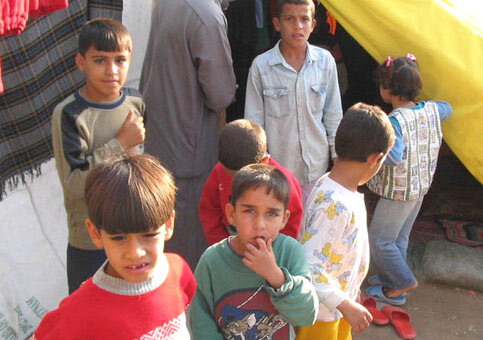The Electronic Intifada 18 May 2007

According to the UNHCR, an estimated 1,400 Palestinians are living in desperate conditions in refugee camps along the Iraq-Syria border. (IRIN)
BAGHDAD, 17 May 2007 (IRIN) - Hundreds of Palestinian refugees stranded at al-Waleed makeshift camp in no-man’s land between the desert borders of Iraq and Syria are living in precarious conditions and people could die if they do not get medical treatment, the UN Refugee Agency (UNHCR) said on 15 May.
“We are particularly worried about the lack of medical facilities - many of the camp’s 942 residents need urgent medical attention, including a mother of seven who suffers from leukemia and a teenage diabetic boy,” UNHCR spokesperson, Jennifer Pagonis, said in a statement on Tuesday.
“The tented camp is overcrowded and many people are suffering from respiratory and other ailments that need proper medical treatment. But the nearest hospital in Iraq is located four hours away by car and the road runs through dangerous territory,” the statement said.
At least three people, including a six-month-old baby, have died from treatable illnesses since the camp opened last December, it added.
“We are dying here”
“What are the neighbouring countries and international community waiting for? Are they waiting for us to be in our caskets? We are dying here and no one pays attention,” said Qussai Mohammed Saleh, 32, a Palestinian truck driver who has been living with his wife and two children in a tent in the al-Waleed border camp since last December.
“We are suffering high temperatures as summer approaches and sandstorms hit us from time to time in this desert,” Saleh told IRIN in a phone interview from the camp.
“We have children, women and elderly people in need of urgent help - especially those with chronic problems like asthma, blood pressure, diabetic and cardiac disorders,” Saleh added.
“If our problems are too big to tackle properly, then bring in a few generators and send in a medical team - that’s not difficult.”
“Deadly environment”
On its latest visit the UNHCR team could only give first aid treatment to some pregnant women, a Palestinian man who had been kidnapped and badly tortured in Baghdad and to a suicidal woman traumatized by the murder of her son and husband.
The UNHCR statement quoted Michelle Alfaro, a Damascus-based UNHCR protection officer, as saying there was no excuse for the suffering of the Palestinians in al-Waleed camp. “They have fled death threats and the murder of family members only to face this deadly environment in al-Waleed,” he was quoted as saying.
The refugee agency also warned that living conditions at al-Waleed are likely to get worse during the summer months. Temperatures of more than 50 degrees Celsius have already been recorded this month, while sandstorms are another regular hazard.
Flight from Baghdad
Water is trucked to the camp on a daily basis, but this is rationed to less than one litre per person because of the increasing numbers of Palestinians fleeing to al-Waleed to escape threats and attacks in Baghdad.
According to the UNHCR, an estimated 1,400 Palestinians are living in desperate conditions in refugee camps along the Iraq-Syria border, unable to cross into a country already straining to cope with hundreds of thousands of Iraqi and Palestinian refugees.
A steady flow of Palestinians have fled Baghdad since March 2006, when intimidation, forced evictions and attacks against their community began mounting.
Syria let a first group cross the border and settle at al-Hol refugee camp in the al-Hassekeh governorate in May last year. A second group was stranded at al-Tanf refugee camp, but those currently fleeing Baghdad can no longer access al-Tanf, home to 389 Palestinians.
Today, Palestinians fleeing Baghdad for the Syrian border have nowhere to go but al-Waleed, which lacks the infrastructure to support them.
This item comes to you via IRIN, a UN humanitarian news and information service, but may not necessarily reflect the views of the United Nations or its agencies. All IRIN material may be reposted or reprinted free-of-charge; refer to the copyright page for conditions of use. IRIN is a project of the UN Office for the Coordination of Humanitarian Affairs.
Related Links


